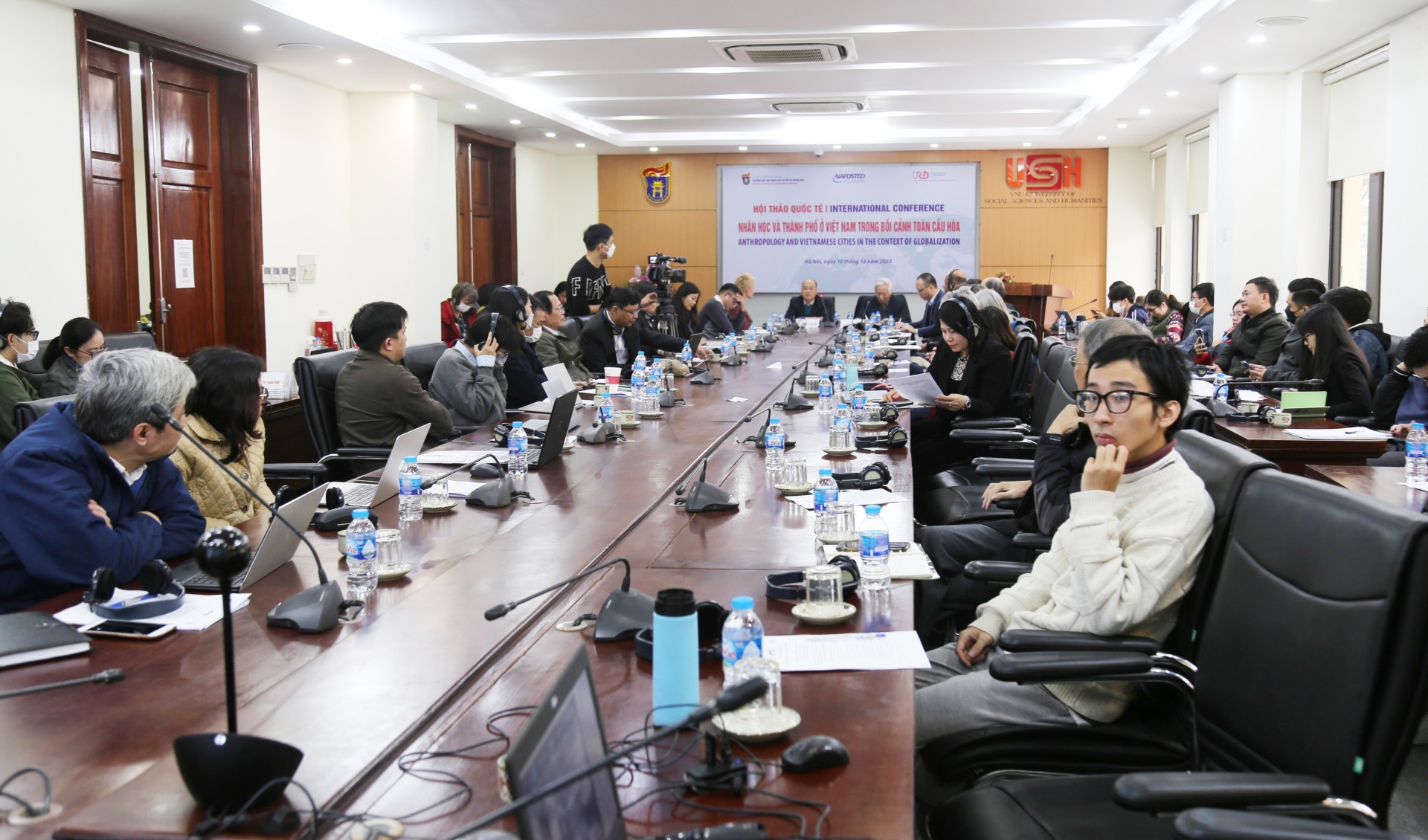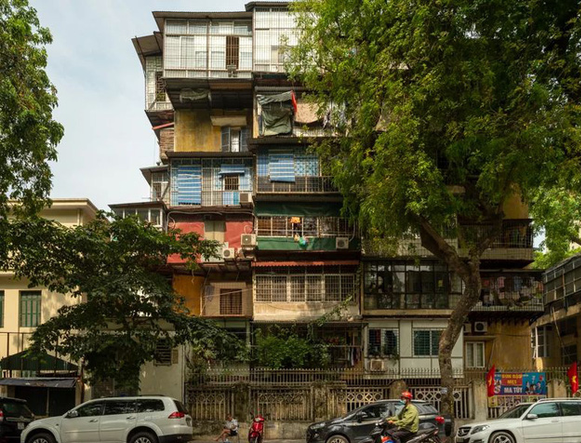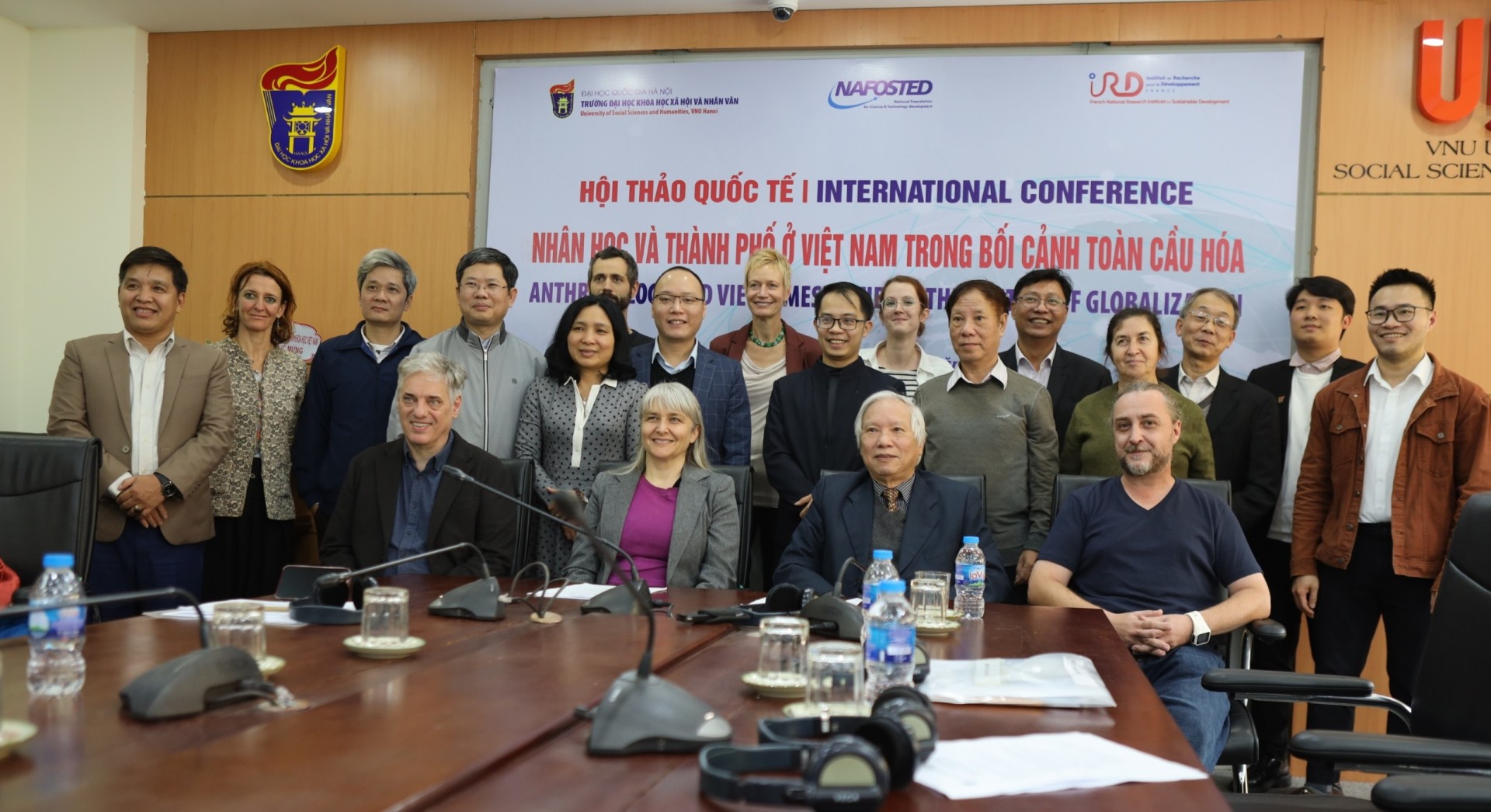The workshop attracted a large number of scientists from universities around the world and in Vietnam: University of California, Yale (USA), Graduate School of Practical Studies (France), University of Toronto (Netherlands), Hue University of Science (Hue), Ho Chi Minh City University of Social Sciences and Humanities (Ho Chi Minh City), RMIT University Vietnam, Institute of Cultural Studies, Institute of Ethnology, Institute of Vietnamese Studies and Development Science, and the Museum of Ethnology. A large number of lecturers, graduate students, researchers, and undergraduates from the Faculty of Anthropology and other faculties/departments within the university also attended. The workshop was held in person at the University of Social Sciences and Humanities and online via Zoom.
A view of the live seminar in the meeting room of the University of Social Sciences and Humanities.
In his opening remarks, Professor Hoang Anh Tuan (Rector) emphasized the significance of the conference: Urban development, or cities, are one of the research subjects with high scientific and practical significance for disciplines in the social sciences and humanities. Using an ethnographic approach, based on sharp perspectives and theoretical systems, anthropologists have provided in-depth analyses and thorough explanations of many aspects of cities and urbanized communities in various parts of Vietnam, as well as in some countries in the region and around the world. The conference updated recent anthropological research results on cities worldwide and in Vietnam; pointed out challenges and proposed multifaceted solutions to help address the limitations and challenges of cities and urban centers in the context of globalization in Vietnam today. Rector Hoang Anh Tuan also expressed his deep gratitude for the support of the National Foundation for Science and Technology Development (NAFOSTED), the Institute for Cultural Studies, and the French Institute for Development Studies (IRD) in numerous scientific research activities, organizing seminars, and publishing monographs.

Principal Hoang Anh Tuan emphasized in his speech that the theme of the conference on traditional and modern urban areas has high scientific and practical significance.
The conference was conducted in three sessions: a plenary session and four subcommittees, focusing on discussions about several key issues: urban transformations in contemporary Vietnam; socio-economic dynamics in Vietnamese cities; cultural dynamics in contemporary Vietnamese cities; and apartment complexes in Hanoi. With 18 presentations and numerous lively and open discussions, the conference shared new research findings and engaged delegates in discussions and interpretations of key academic and policy-oriented issues stemming from discoveries about Vietnamese cities in the context of globalization from both contemporary and historical perspectives.
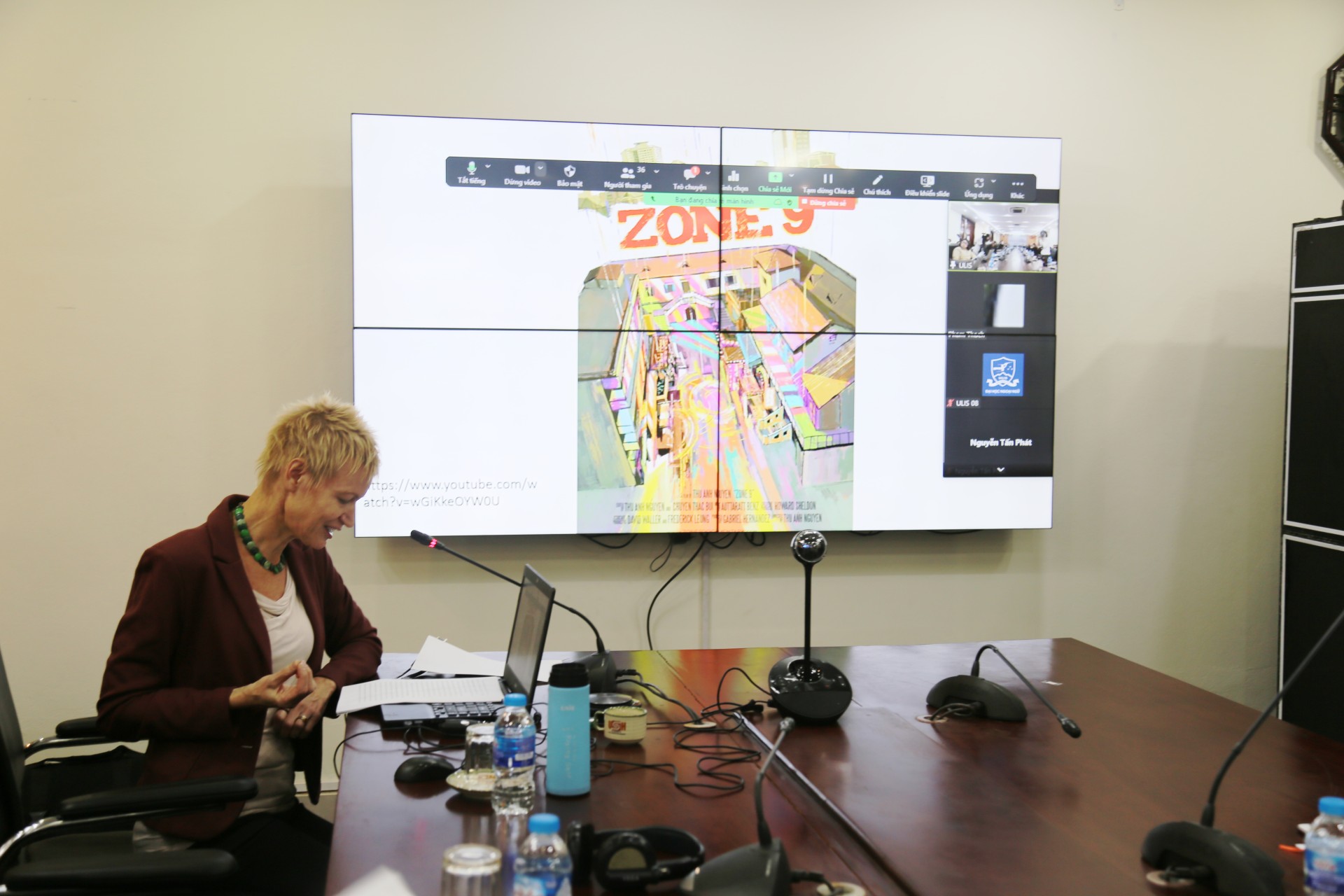
Professor Christina Schwenkel (University of California, Riverside, USA) presented a very vivid report on the old apartment complexes of Hanoi and Vinh (Nghe An).
The story of the apartment complexes Hanoi was the most important topic, attracting significant attention and lively discussion among delegates at the workshop (Photo: Tuoi Tre Online).
Studies have shown that cities in Vietnam and around the world are undergoing rapid transformation in terms of role, function, architecture, economic activities, cultural life, and population composition; there is a blending and parallel coexistence of traditional values. Therefore, the issue of developing cities in a modern, dynamic direction that meets the increasingly diverse needs of people while preserving and developing traditional values in history, culture, politics, art, etc., for sustainable development is considered a central issue for major cities worldwide, not just in Vietnam. The authors also cite typical examples such as old urban areas in Hanoi, Nghe An, and Ho Chi Minh City that have deteriorated and become dilapidated, but also possess significant historical, cultural, and artistic meaning, reflecting many aspects of social life during a particular period. The big question is how to preserve parts of old urban areas during the development of new cities in Hanoi and other cities while still ensuring safety.
Based on this multifaceted perspective, the authors also propose several specific solutions aimed at preserving cultural and historical values and traditional identity while ensuring the dynamism, modernity, and sustainable development of urban areas.
Concluding the conference, on behalf of the Organizing Committee, Dr. Nguyen Vu Hoang (Deputy Head of the Department of Anthropology) expressed gratitude to the partner units, research institutes, educational organizations, and scientists from both within and outside the country who have collaborated and supported the successful organization of the conference. The conference clarified many issues and opened up many new research directions on a topic that has long been of great interest to researchers: contemporary cities from a multi-dimensional, interdisciplinary perspective, while also offering comprehensive solutions for urban development. The research topics and scientific issues were novel and represent a breakthrough in the anthropological approach to urban research. Dr. Nguyen Vu Hoang stated that after the conference, these reports will be revised by the authors, and the expert panel will continue to provide feedback and critiques to aim for publication as a high-quality monograph for the social sciences and humanities.
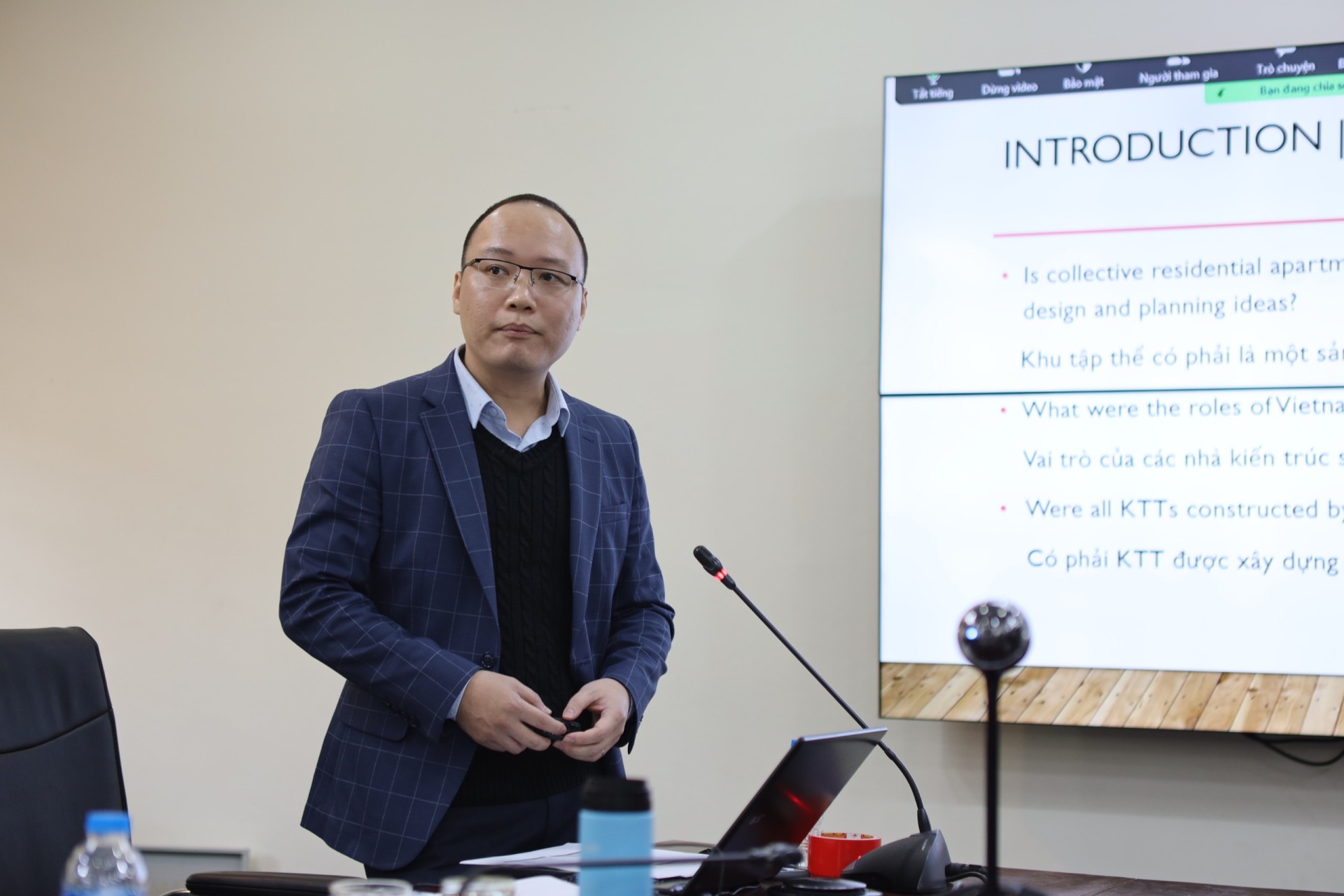
In his closing remarks, Dr. Nguyen Vu Hoang highlighted several key points that the delegates had reported on, commented on, and discussed at the conference.
The delegates attending the workshop took a commemorative photo.
